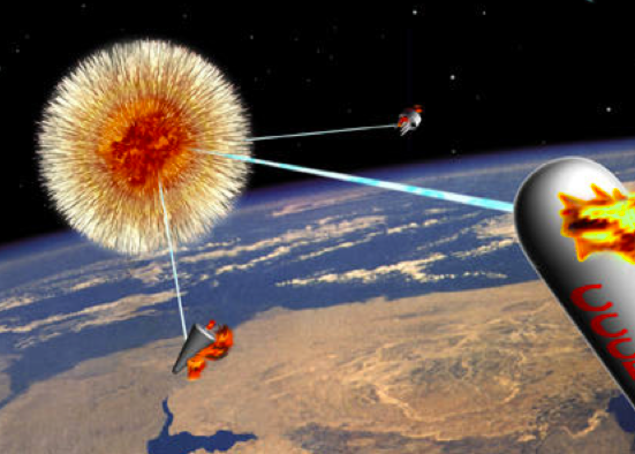Laser Weapons in Space Will Shoot Down Missiles
Article by Kris Osborn September 18, 2020 (nationalinterest.org)
• The space environment is highly conducive to laser weapons. Laser technology is being developed that carries a multitude of applications, particularly in space. The obvious application is space-based anti-missile laser weapons which can be used at “scalable” levels, ie: they can be used solely for detection and surveillance, or they can be gradually powered-up to stun, disable or destroy a target, or even to simply ‘jam’ enemy weapons or communications networks. A laser can be fired from an orbiting satellite to hit an inter-continental ballistic missile (ICBM) at different phases of the missile’s trajectory.
• Weapons developers are now working on “power-scaling” laser systems to engineer weapons strong enough to incinerate enemy missiles in space. This not only requires range but also power systems sufficient to generate the desired effects. The Pentagon is developing surface ship-fired lasers strong enough to travel out to the boundaries of the Earth’s atmosphere. Defense contractors are working on a new kind of unmanned ‘space drone’ able to travel beyond the Earth’s atmosphere for missile defense, surveillance or attack missions.
• Lasers travel more effectively beyond the earth’s atmosphere and experience less “beam attenuation” or weakening which can often happen due to weather or other obscurants operating closer to Earth. Also, lasers can attenuate at longer ranges, and many beams need to be consolidated into a single weapon to generate enough power to achieve the desired effect.
• A lesser known application is the use of lasers as optical sensors, according to experts with the Air Force Research Laboratory. “Lasers are super useful as optics in space. We view lasers as foundational to our space architecture,” says Colonel Eric Felt, Director, Air Force Research Laboratory Space Vehicles Directorate, Kirtland Air Force Base.
Space-based anti-missile laser weapons calls many military possibilities to mind. After all, there are already different lasers built, some more often

discussed than others. For instance, is well known that lasers are being explored for intercontinental ballistic missile (ICBM) defense in space. Moreover, the Missile Defense Agency officials tell The National Interest that weapons developers are now working on “power-scaling” laser systems to engineer weapons strong enough to incinerate enemy missiles in space. This not only requires range but also power systems sufficient to generate the desired effects.
Where would they fire from? Well that is a fascinating question which is already receiving a lot of attention. Lasers could at some point fire directly from satellites to burn holes in ICBMs either in space, during a beginning boost phase or during the terminal phase as it is closing in on a target.
Also, the Pentagon is developing surface ship-fired lasers strong enough to travel out to the boundaries of the earth’s atmosphere. Engineers at firms like Booz Allen Hamilton are already doing conceptual work on the possibility of building new kinds of hardened, space drones or unmanned systems able to travel beyond the earth’s atmosphere for missile defense, surveillance or even attack missions.
Much work still needs to be done, yet initial efforts are beginning to show great promise, as many explain that the space environment is highly conducive to laser weapons. Lasers travel more effectively beyond the Earth’s atmosphere and experience less “beam attenuation” or weakening which can often happen due to weather or other obscurants operating closer to earth. Also, lasers can attenuate at longer ranges, and many beams need to be consolidated into a single weapon to generate enough power to achieve the desired effect.
FAIR USE NOTICE: This page contains copyrighted material the use of which has not been specifically authorized by the copyright owner. ExoNews.org distributes this material for the purpose of news reporting, educational research, comment and criticism, constituting Fair Use under 17 U.S.C § 107. Please contact the Editor at ExoNews with any copyright issue.
